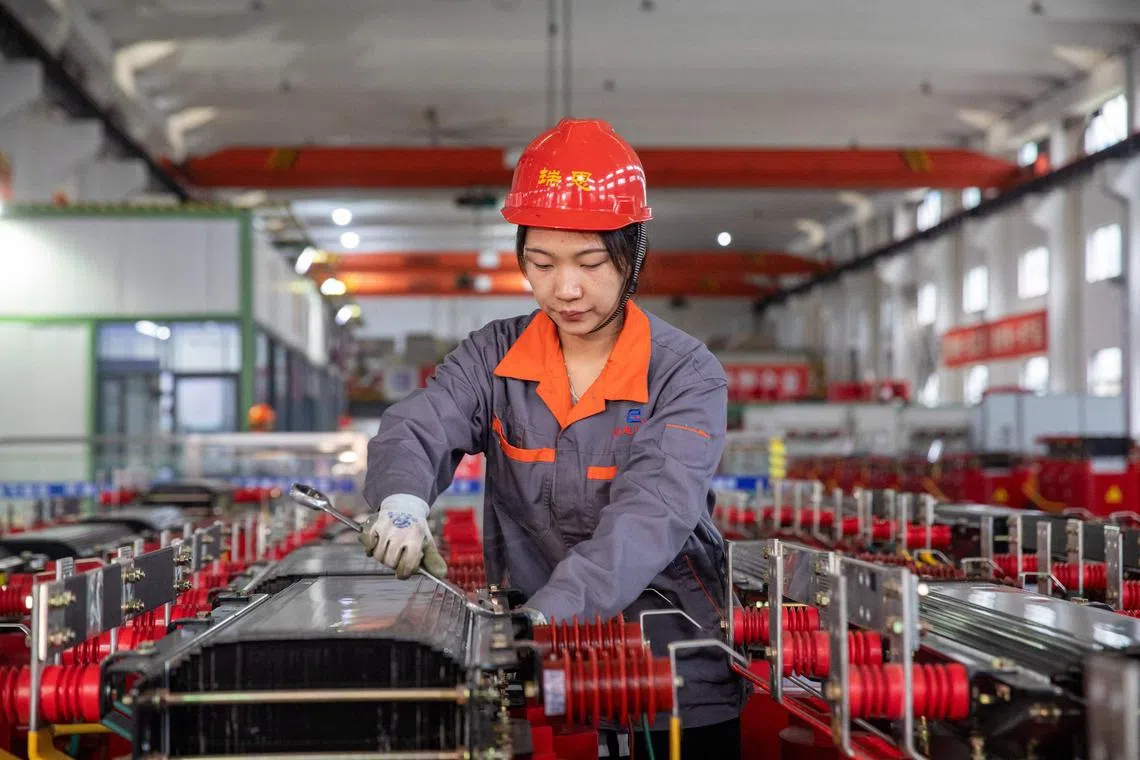Address social stigma to attract vocational school students, say parents in China
Sign up now: Get insights on Asia's fast-moving developments

Official projections estimate that China will be short of 30 million blue-collar workers by 2025.
PHOTO: AFP
BEIJING - When Ma Jiu, 17, graduates from vocational school in July 2023, he hopes to land a job at Beijing Railway Administration as a traffic controller – a career choice not favoured by many in China.
“There is a lot of stigma surrounding students like me, and the blue-collar workers we will become,” the teenager, who is studying at a school in northern Beijing’s Changping district, told The Straits Times.
“But I’ve never been able to produce good results in primary and junior high school, so this might be my best choice in life,” he added. “My family is not well-to-do, so it is not like they can send me overseas for a better education.”
China has been trying to nudge more of its youth to take the path that Ma is on to fill a growing demand for blue-collar workers – a move that students and parents told ST will be difficult, given society’s discrimination against vocational schools.
Official projections estimate that China will be short of 30 million blue-collar workers by 2025, which the authorities have been trying to fill with graduates from its 11,300 technical education institutes – the world’s largest vocational education system.
The shortage of blue-collar workers is expected to weigh on the growth of China, the world’s factory. Already, plant owners have complained that they are finding it increasingly hard to attract workers, who may prefer the better flexibility and pay of delivery riders.
Currently, more than 30 million students are enrolled in vocational schools, local media reported. But the figure may not be sufficient to make up for the shortfall, particularly in the manufacturing and service sectors, according to a Dec 28 report by Capital University of Economics and Business in Beijing.
Youth in China are “increasingly unwilling to do manual labour and take on blue-collar jobs”, despite record high unemployment for those between the ages of 16 and 24, the report said.
Official statistics show that China’s youth unemployment rate hit 19.9 per cent in July 2022, largely due to poor business sentiment brought about by Covid-19 outbreaks and a crackdown on tech companies. In December, the rate was 16.7 per cent, figures on Tuesday showed.
The report also pointed out that the country’s blue-collar workers are getting older, with nearly half of the country’s 400 million blue-collar workers aged over 40, higher than the average age of 38.8 for the entire workforce.
To boost the status of vocational schools in society, China revised its vocational education law in 2022 – the first major reform since it was introduced in 1996 – to mix technical courses in academic high schools and offer better career guidance to blue-collar workers.
But parents said the government must do more, including charting better career paths to what they see as “dead-end” jobs such as plant, farm and railway workers, and providing more pathways to universities.
Many parents prefer that their children attend academic high schools, which allow students to enter universities.
“Parents cannot help comparing children, because, in China, how our children behave is a reflection on us and their upbringing,” said a bank worker, 36, who only gave her surname as Zhou. She has two sons, aged three and five.
“Our children’s future, and what we are doing for them, is a topic that comes up at major gatherings like Chinese New Year reunions and during everyday life, among colleagues, mummy groups and conversations with our own parents,” she added.
Madam Zhou, whose husband works in the financial industry, said they spend close to 40 per cent of their income on private tuition and enrichment classes for her two boys. She declined to give her full name because she did not want to be seen as undermining China’s ban on after-school tuition for compulsory subjects
Authorities enacted the ban to lower the costs of bringing up children, which parents have cited as a reason for not having more kids as China faces an all-time low fertility rate. Its population shrank for the first time in 60 years in 2022,
Ma, the vocational student in Beijing, said: “There is often an awkward silence when relatives or people we don’t know very well ask my parents about where I’m studying... My parents told me that it is okay, and they hope that I will continue doing my best but I know that they wish I can do better.”
“Sometimes I really admire other countries, which respect so-called blue-collar jobs as careers that require craftsmanship and skill,” he added.
Mrs Zhang, a project manager, whose 18-year-old daughter is studying at a technical institute, said: “I know my child is not cut out for studying, and where she studies does not change the fact that she is a good and kind person... but somehow when relatives ask me about her, I am a bit embarrassed and feel that I’ve to explain why she is in a vocational school.”



